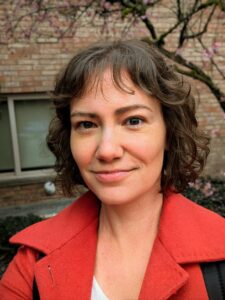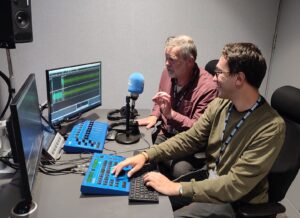26 November 2025
AGU press contact:
Liza Lester, [email protected]
WASHINGTON — AGU has awarded journalists Brooke Jarvis, Roland Pease and Jonathan Blackwell for their reporting on the Earth and space sciences. (Browse all AGU 2025 honorees here.)
Brooke Jarvis is honored with the 2025 Walter Sullivan Award for Excellence in Science Writing – Features. Her winning story in The New Yorker plumbs the long effort to fix a definition of sea level amidst dawning scientific and social understanding of an Earth undergoing constant change.
Roland Pease and Jonathan Blackwell share the 2025 David Perlman Award for Excellence in Science Writing – News for a BBC radio story evoking the excitement and urgency of plans to study the asteroid Apophis as it closely passes Earth in April 2029 — perhaps the biggest event in planetary defense this decade.
These two AGU journalism awards will be formally presented at AGU’s Honors Ceremony during AGU’s 2025 Annual Meeting in New Orleans, Louisiana, in December.
Walter Sullivan Award for Excellence in Science Writing – Features
 AGU recognizes Brooke Jarvis for “Our Very Strange Search for ‘Sea Level’” published in The New Yorker magazine on 19 August 2024. The Walter Sullivan Award, named for the late New York Times science writer, honors excellence in science feature reporting for work prepared with a deadline of more than one week. The award comes with a $5,000 prize, a plaque, and funds to attend AGU25.
AGU recognizes Brooke Jarvis for “Our Very Strange Search for ‘Sea Level’” published in The New Yorker magazine on 19 August 2024. The Walter Sullivan Award, named for the late New York Times science writer, honors excellence in science feature reporting for work prepared with a deadline of more than one week. The award comes with a $5,000 prize, a plaque, and funds to attend AGU25.
Brooke Jarvis is a freelance science journalist and a contributing writer to The New York Times Magazine. She has written for The New Yorker, Wired, and many other publications and specializes in long form narrative writing about unexpected and complex intersections of science and society. She is a past winner of the Livingston Award for National Reporting and the Schmidt Award for Excellence in Science Communication from the National Academies of the Sciences, Engineering, and Medicine. She lives in Seattle, Washington.
Jarvis’ sea level deep dive stood out to the Sullivan Award committee for its elegance and originality as it traced humanity’s centuries-long quest to measure the sea, from fifteenth-century observations to modern satellites, offering a sweeping yet precise and accessible history of how science progresses.
The committee found the narrative information-rich yet easy to read, transforming a topic often framed by catastrophe into one of curiosity and discovery. Jarvis illuminated both the complexity of sea-level science and its urgent relevance, offering a model of how thoughtful storytelling can connect readers with the heart of Earth science. Her story captured the essence of the Sullivan Award by combining rigorous reporting, a fresh angle on a vital Earth science topic, and a storytelling approach that draws readers in and leaves them eager to learn more.
David Perlman Award for Excellence in Science Writing – News
 AGU recognizes Roland Pease and Jonathan Blackwell for the radio story “An armada for asteroid Apophis?”, which aired on 26 April 2024 on the BBC World Service weekly radio program Science in Action. The David Perlman Award, named for the late San Francisco Chronicle science editor, recognizes excellence in science news reporting published with deadline pressure of one week or less. The award comes with a $5,000 prize, a plaque, and funds to attend AGU25.
AGU recognizes Roland Pease and Jonathan Blackwell for the radio story “An armada for asteroid Apophis?”, which aired on 26 April 2024 on the BBC World Service weekly radio program Science in Action. The David Perlman Award, named for the late San Francisco Chronicle science editor, recognizes excellence in science news reporting published with deadline pressure of one week or less. The award comes with a $5,000 prize, a plaque, and funds to attend AGU25.
Freelance science writer and broadcaster Roland Pease presented the long-running Science in Action from 2016 to November 2025. Before that, from 1993 as a member of the BBC Radio Science team, he produced and presented programs on diverse themes, including a history of life on Earth, climate change and geohazards. He has also reported for Nature, Science magazine, New Scientist, The Guardian, and Big Picture Science. He has a BSc in Physics and Chemistry and lives in Swindon, England.
Jonathan Blackwell is a journalist with the BBC Audio Science Unit, working on science and health programs for BBC Radio 4 and the BBC World Service. He now mainly works on the programs Inside Science, CrowdScience, Discovery and Health Check. He has been a journalist for BBC Local Radio, BBC Minute and the BBC General News Service as well as producing the Science: Disrupt and Gender Knot podcasts. He lives in Cardiff, Wales.
The Sullivan award selection committee said the BBC World Service team’s reporting exemplified the spirit of the Perlman Award, capturing the sense of both science and urgency in real time as researchers hammered out priorities at the Apophis T-5 Years conference at the European Space Research and Technology Centre in the Netherlands on 22-24 April 2024.
Tight edits kept the story moving along, while the narrated sections provided vividness and context to what the scientists were saying. By nudging scientists to answer questions in short, clear phrases, the committee said, the journalists crafted what could have been a jargon-laden planetary science snoozefest into a fast-paced description of the key information that researchers want to get from Apophis before, during and after its flyby.
Nominations for next year’s journalism awards will open in early 2026.
AGU (www.agu.org/) is a global community supporting more than half a million professionals and advocates in Earth and space sciences. Through broad and inclusive partnerships, AGU aims to advance discovery and solution science that accelerate knowledge and create solutions that are ethical, unbiased and respectful of communities and their values. Our programs include serving as a scholarly publisher, convening virtual and in-person events and providing career support. We live our values in everything we do, such as our net zero energy renovated building in Washington, D.C. and our Ethics and Equity Center, which fosters a diverse and inclusive geoscience community to ensure responsible conduct.